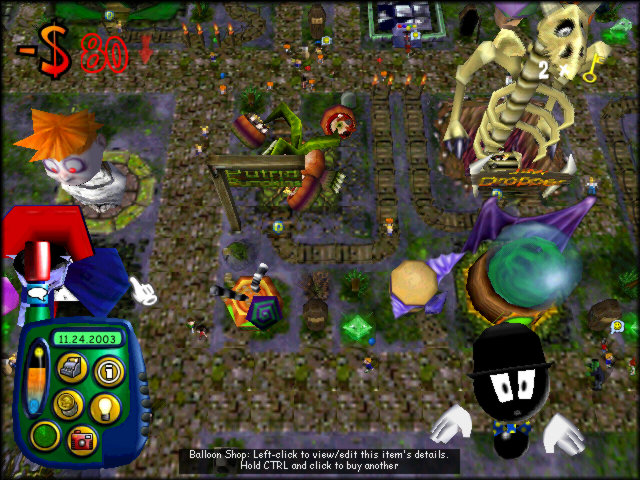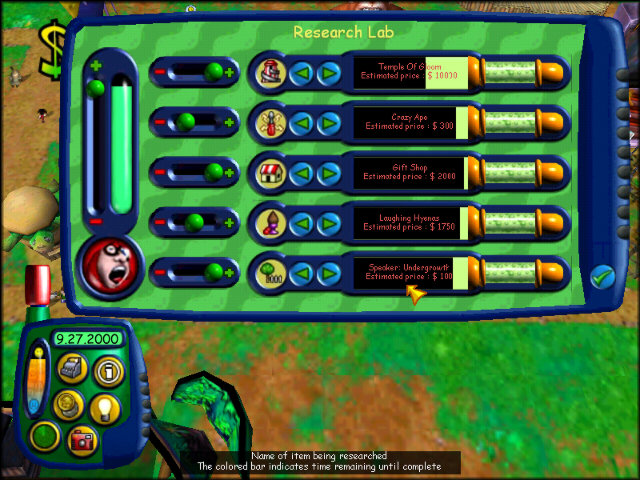Dark Moon is an anomaly o’ a sequel for me: most sequels fall into 3 categories:
- Is very similar to its predecessor, but much better or worse.
- Is very similar to its predecessor, but hardly different.
- Is completely different from its predecessor & much better or much worse.
Dark Moon is odd in that it feels like a Luigi’s Mansion — it doesn’t depart too much — but doesn’t feel too derivative, nor does it feel like it’s much better or much worse. It just feels different, but while still keeping to the main formula.
Gameplay
I’m bewildered by the main point made by those who prefer the original, not ’cause I don’t share the sentiment — I do — but ’cause it’s hypocritical, as the issues they claim Dark Moon has are also in the original.
The main complaint is that Dark Moon worsens the nonlinear, exploratory feeling by making it mission-based. The problem with this is that the original didn’t do a great job o’ that either. People complain ’bout the missions ruining exploration in Dark Moon ’cause they interrupt your exploration to push you back to E. Gadd’s & make you start back @ the start ’gain. They also complain ’bout how Dark Moon has each mission o’ a mansion generally focus on a different part o’ the mansion, making it feel linear. ’Cept the original does the same thing: it splits the game into 4 “missions” that focus on 4 different parts o’ the mansion: the 2nd floor, the 1st floor, the 3rd floor, & the basement. After the boss o’ each “mission”, you’re forced to return to E. Gadd’s, & then you’re sent back to the start, which is mainly a hub to the other parts o’ the mansion. This isn’t an exaggeration, either, as the length o’ the entire 1st game is ’bout as long as each level in Dark Moon — so each part pretty much is like a mission.
Nor was the mansion in the original as nonlinear as some blinded with nostalgia claim: while there were a small few o’ portrait ghosts you could skip, & a few secret areas, you had to explore most o’ the areas & fight most o’ the portrait ghosts, & you usually always did them in the same order as you usually needed to beat a portrait ghost to get a key to get to the next, & so on.
Thus, I agree with the sentiment, but disagree with the conclusion, & am still mixed: while we could say that Dark Moon wasted potential by not improving on the original’s weakly-done exploration, those who prefer the original forget that it failed @ being all that exploratory itself.
There are a few ways in which Dark Moon was inferior to the original, but none o’ them are as big as the nonlinear problem, nor inherent in the mission system. The 1st is that you can only save ’tween missions, while the original let you save any time you caught a boo or encountered a Toad, a bewildering decision for a handheld game. I blame the recent unfortunate fad o’ creating “difficulty” by borrowing bad design decisions from ol’ games. People complained ’bout games during the N64 & GameCube era being too easy, & such games also generally saved all the time ( Mario 3D games would save after every star or shine, for example, making game o’er borderline pointless ), & then games started to turn toward becoming much harder, & 1 o’ the “techniques” was trying to make game o’er threatening ’gain by limiting saves, such as in New Super Mario Bros. ’Cept like most challenge techniques from the NES era, this is a lazy, cheap attempt @ difficulty that was only done back then ’cause it wasn’t as practical to have easy saving ( or saving @ all )1.
The 2nd problem is the way the game constantly interrupts you so E. Gadd can tell you exactly what to do, insulting your intelligence. This is a bit mo’ linked to the exploration problem, as it constantly takes you out o’ the game & tries to micromanage what you’re doing. It is also, sadly, a fad that has been burgeoning in the last decade or so. However, it’s not intrinsically linked to the mission system.
Sometimes the portrait ghosts had mo’ creative puzzles for defeating them than the ghosts in Dark Moon, but Dark Moon had some interesting puzzles o’ its own, & we’ll save most o’ our discussion on the portrait ghosts for the “aesthetics” section.
Dark Moon improves on the original in other ways. It has collectible jewels that actually improves exploration o’er the original. 1 o’ the problems with the original is that there’s not much to do other than to fight ghosts & maybe get money — & most o’ the money is in annoyingly rare & sometimes random golden ghosts. A’least Dark Moon’s golden ghosts are consistent. Unfortunately, Dark Moon’s jewels fall into “Super Mario Sunshine Syndrome” & have some jewels only appear on certain missions, which forces you to explore most places many times just to make sure the game doesn’t jape you. I’d recommend trying to explore a while, & then once you get bored, just read a walkthrough; nobody will care whether or not you found them on your own, since nobody cares whether or not you can do well in a baby game like Luigi’s Mansion — this isn’t a competitive game like Super Smash Bros. Melee or Fire Emblem.
Dark Moon is also less harsh on punishing you for mistakes. In Dark Moon you can permanently fuck up a mission, but you can always retry it. In the original, you can easily permanently fuck up the entire game, forcing you to restart the entire game if you’re going for a good score. Granted, getting the best score in the original is mo’ a bonus, whereas the rankings in Dark Moon are right in your face.
I also thought Dark Moon handled Boos better. Finding them is actually a puzzle, whereas in the original they were just in some random thing in almost every room. Having only 1 Boo per mission is also less repetitive & boring than the original’s whopping 50 Boos, with 1 in almost every room.
Dark Moon also has that weird rainbow flashlight thing that reveals secret things, which is cool. It’s unfortunate that it doesn’t have the fire, water, & ice shots that are in the original, but Dark Moon does still make clever use o’ fire, water, & ice, & I think the rainbow flashlight’s better.
Dark Moon also had better bosses, though the original’s weren’t bad. Fake Bowser is a lame cock-tease compared to the fight gainst King Boo in Dark Moon, divided with races through a twisted hallway. Boolossus, though they got his name wrong in Dark Moon, was also better in Dark Moon, ’cause he had a train. The spider boss had clever scenery puzzles, the clock-based boss was a creative idea, & then you have the possessed armor. In general, the original’s bosses were mostly just dodging & attacking, while Dark Moon’s had mo’ a puzzle aspect to them. Luigi’s Mansion was always better @ puzzles & exploration, not action, so that’s definitely an improvement.
Dark Moon also has escort missions with Toads, which many people predictably criticize, but I didn’t think they were that bad. That Toads aren’t that hard to bring ’long, & unlike most escorts, they actually do give you abilities you don’t otherwise have, such as being able to shoot them places. Plus, I love the squeakiness o’ their shoes. I’ve ne’er been a huge fan o’ Toad, so I was surprised that I actually found them endearing in this game.
In general, I must say that Dark Moon probably had the best gameplay, which isn’t a rare belief. However, I agree with the sentiment that those few who defend the original’s gameplay & think that a 3rd Luigi’s Mansion could easily best both if it truly did the “1 big mansion, lots o’ freedom & exploration” thing. The original was simply too small & short & simply limited you too much to succeed @ that any better than Dark Moon.
Aesthetics
This is where most people agree… but not so much with me. E’en people who prefer the gameplay o’ Dark Moon lament its s’posedly inferior atmosphere & aesthetics.
The original was a bit mo’ horror, while Dark Moon is mo’ cartoony. The original is much darker & everything looks mo’ dusty & grayer, while Dark Moon is very colorful, with lots o’ neon colors. & while Dark Moon mostly has cute, cartoony ghosts, the original had freakier, mo’ human-shaped portrait ghosts.
I’m mo’ mixed than most people. I actually think Dark Moon looks gorgeous & like how colorful it is. It sort o’ reminds me o’ Scooby Doo: it’s not scary, but it’s stylish.
That said, I do prefer the portrait ghosts to the generic Pac-Man ghosts in Dark Moon — ’cept Ghost Dog: Ghost Dog is a great new pet & I write fan fiction ’bout it & Luigi’s further adventures all the time. I’m not sure how someone couldn’t, since, I mean, c’mon — they’re generic Pac-Man ghosts, while the portrait ghosts have a variety o’ strange designs.
This ties into the original being mo’ “horror” than Dark Moon. The original is somewhat creepy, not only in its general look, but also in the implications for how some o’ the portrait ghosts became ghosts — including babies & young children. The original dealt with the subject o’ death much mo’, including a clever point where a portrait ghost that had been on your side for most o’ the game finally just lets you suck her up in what must be 1 o’ the easiest portrait ghosts to beat ’cause she wants to rest in peace. Meanwhile, Dark Moon doesn’t deal with the subject o’ death much & nobody truly thinks ’bout where the Pac-Man ghosts came from ’cause they’re too cartoony. It also has a lot, lot mo’ slapstick, which isn’t truly all that funny, but not truly all that bad, either.
But the main focus is the area. In this case, I may have to prefer Dark Moon. The original doesn’t look bad, but there’s just not as much variety: that’s the advantage Dark Moon had by having multiple mansions, a chance to mix the o’erall haunted theme with jungles, sand, & snow.
Ironically, though, I feel like Dark Moon becomes mo’ horror near the end while the original becomes mo’ cartoony. King Boo becomes strikingly angry for revenge @ the end o’ Dark Moon, while the Fake Bowser fight in the original where you make it lose its head — including it sometimes putting it on backward & running round crazy — is just silly.
& this is going to sound silly, ’specially from me, but Dark Moon had better writing & a better story. Granted, neither are Kafka, & Dark Moon does lose points for constantly interrupting gameplay with E. Gadd’s gabbing; but Dark Moon’s plot made mo’ sense & actually had character development.
The original’s plot didn’t make much sense: Luigi wins a contest he didn’t enter & doesn’t suspect a trap, e’en though he knows he has enemies. Then, while he’s there, he learns that King Boo kidnapped Mario… ¿& then tricked Luigi into coming so he can save him? ¿Why not just trick Mario into coming & capturing him? ¿& why was it so easy to capture Mario, but not Luigi?
King Boo’s motive in Dark Moon made mo’ sense, albeit relied on the original a bit: he wanted revenge gainst the 2. In this case, it makes sense for him not to just capture Luigi as easily as Mario ’cause he wants to prove himself gainst Luigi. & Luigi isn’t just dicking round in a mansion ’cause he won it in a contest, but is trying to fix some moon thing to stop ghosts from wrecking terror on the world.
Luigi also has character development in Dark Moon: you can see him gradually become braver as the game goes on, & becomes mo’ comfortable with ghosts, ending with Luigi e’en adopting Ghost Dog as a pet @ the end. Meanwhile, Luigi doesn’t change @ all throughout the original: he’s stick scared shitless by what appears to be Bowser @ the end, which makes no sense, since he fought Bowser a million times. If anything, the sight o’ Bowser should’ve assured him since it ’splains everything mo’ than anything else why ghosts would be going after them.
Both games have great main themes, which are o’erused. I think I found Dark Moon’s a bit mo’ memorable, but prefer the original’s soundtrack as a whole. While Dark Moon has some good remixes — I recommend “Old Clockwork” & “Secret Mine” the most for both the main theme & “Old Clockwork” for the “Outlanding Interruption” theme — o’ its 2 good songs… I only remember those 2 good songs & the latter still sounds similar to the 1st, whereas the original has that wicked but sadly underused song that plays while tallying up ghosts after an act, that other great, underused song, the song that plays when the portrait ghosts 1st talk to you, the song for catching a boo, Bogmire’s theme, &, ‘course, the credits theme.
But that’s all minor. In general, I’d consider Dark Moon slightly better in terms o’ gameplay & the original slightly better in terms o’ aesthetics; & ’mong the 2, I’d consider Dark Moon slightly better, but not by much.
What’s mo’ interesting is that there’s still room for expanding on the goal that both were s’posed to serve — a huge mansion rife for free, nonlinear exploration — in a 3rd game.













